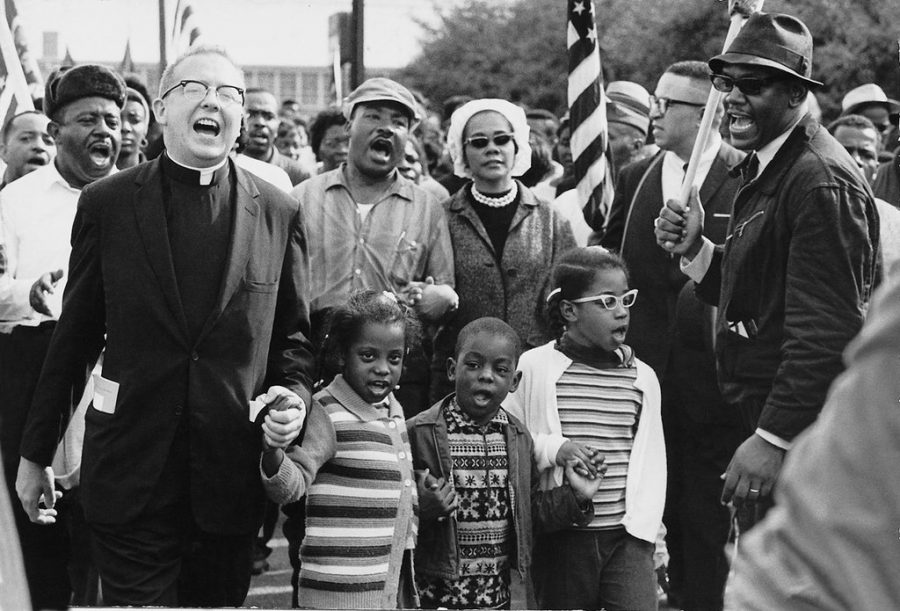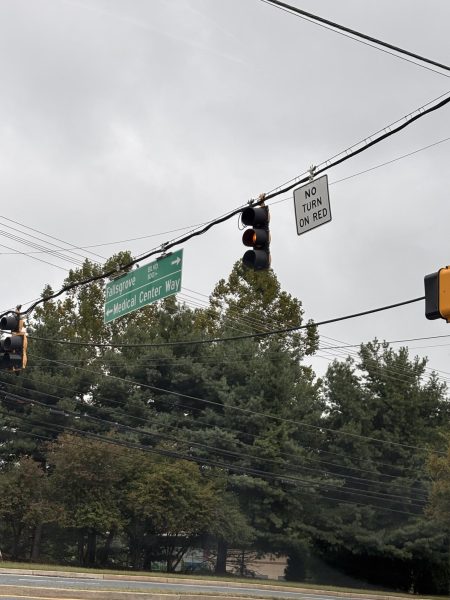Florida Governor Ron DeSantis bans AP African American Studies class
Photo used with permission from Google Commons
Civil Rights Movement co-founder David Abernathy marches with Martin Luther King Jr. from Selma to Montgomery in 1965.
In January, the Florida Department of Education (FDOE), led by Governor Ron DeSantis, banned the pilot AP African American Studies course from being taught in high schools. DeSantis justified this move by citing its violation of Florida’s educational laws, specifically its policy of ‘education, not indoctrination.’ In a letter to the College Board (the business in charge of AP courses), the FDOE also called the class “educationally lacking.”
The course has gone through rigorous development, being created a decade ago and being worked on by the College Board and scholars continuously. The original curriculum contained information about the effects of mass incarceration, the Black Lives Matter Movement and a section about Black Queer studies. Republicans in Florida also objected to a unit about Intersectionality, stating it violated their anti-Critical Race Theory policies. Last year, DeSantis signed the Stop W.O.K.E Act, which banned the teaching of Critical Race Theory. “This legislation is the first of its kind in the nation to take on both corporate wokeness and Critical Race Theory in schools in one act,” a statement on DeSantis’ website says.
After Florida rejected the course, the College Board released a new curriculum, with various changes from the original. These changes included taking out all studies about reparations, cutting down the information on Black gay life, and taking out Black authors such as Audre Lorde and Alice Walker. The College Board announced the changes were not caused by DeSantis’ actions but had been in the works. “The fact of the matter is that this landmark course has been shaped over years by the most eminent scholars in the field, not political influence,” the College Board said in a statement.
Critical Race Theory and Intersectionality in America
DeSantis has made his issue with Critical Race Theory (CRT) widely known over his time as governor, banning the teaching of it in K-12 schools, and also passing legislation that bans instruction discussing the idea that anyone is privileged/oppressed based on race. However, CRT is a college-level academic and legal concept, teaching that racism is not just a product of individuals, but that it is built into the medical, legal and employment systems of America. An example of this theory in American history is redlining. Redlining is a practice from the 1930s where officials would ‘redline’ certain neighborhoods as having high financial risks, solely based on the race of people living there. This caused banks not to give mortgage loans to Black people in those areas, making it much more difficult for Black Americans to own homes and accumulate generational wealth. These inequities prevented Black businesses from growing and made it difficult for Black people to buy properties.
A major part of CRT is the concept of intersectionality, which essentially states that an individual’s experience with discrimination can be affected by overlapping factors such as race, gender, class and sexuality, as well as others. Opponents of bans on CRT argue that these efforts aim to stop discussion about systemic racism in the US and overall stifle what children learn about Black history.
Reactions to the ban in Florida
While conservatives have applauded DeSantis for his actions, others have objected to them. Reverend Dr. D.B. Holmes, a former Republican who delivered the prayers at DeSantis’ first inauguration, spoke out against the ban. “Black history is not inferior, and Black history does not lack educational value,” Holmes said.
He became an Independent after taking issue with DeSantis’ handling of the COVID-19 pandemic and penalizing of mask mandates. Along with the activist and Reverend Al Sharpton, Holmes is organizing multiple protests against DeSantis’ ban. Students in Florida have also expressed their anger with the ban, with some considering suing DeSantis. With Floridian students having experienced multiple limits placed on their education, this ban may be the last straw for some. Civil rights attorney Ben Crump has promised to represent three Florida students in a lawsuit against DeSantis if the course is not unbanned.
Wootton students critical of College Board, ban
Students here at school have also expressed their reactions to the Florida government’s actions. “In all honesty, I found it quite funny [when it was banned]. Firstly, Black history is, undoubtedly, American history. Without the multiplicity of contributions which Black people have made to the US, there would be no US today. From the White House, to the stoplight, to locomotors, our people have quite literally built this country with our own hands. To not teach about the aforementioned, I think it to be inappropriate and hypocrisy of the highest order when considering the fact Florida has no problem [allowing the] teaching [of] subjects such as AP European History,” senior and Black Student Union (BSU) vice president Landon Townsend said.
While the College Board has rejected the idea that they changed the curriculum because of DeSantis, students here disagree. “By changing the curriculum of the course, I feel as though College Board is ‘bending the knee’ to Florida and looking for an easy escape instead of asserting themselves, however, we cannot expect actual social change to come from [College Board],” Townsend said.
Problems Within College Board
The criticisms of the decision to change the curriculum have also created a larger debate about the morality of an organization like the College Board. The College Board has a virtual monopoly over the testing industry, administering the SAT, and all AP exams. The organization defines itself as a non-profit, yet has also been accused of misusing its funds. In 2019, the organization made $1.1 billion in revenue. This money is made through charging students to take AP exams, the SAT and other services like the SAT Answer Service. Instead of using large amounts of money to lower exam costs for students, the funds go towards the CEO of the College Board and other executive members. In 2019, CEO David Coleman made $1.67 million and other members made hundreds of thousands. “[College Board is] a predatory, capitalistic organization which brands itself as a ‘non-profit,’ yet profits off of the backs of high school students’ test fees,” Townsend said.
In newly released documents, it appears that the College Board lied about the changing of the curriculum. A letter from the FDOE to the College Board was released on Feb. 7 by the Daily Caller and verified by a spokesperson for the FDOE. While the College Board has previously advocated that they hadn’t made any changes because of political influence, the letter appears to contradict those statements. In the letter, there are discussions about meetings between College Board and FDOE to talk about disagreements over the course, with the College Board agreeing that the class would be revised. The letter mentions that College Board originally pushed back against the FDOE’s request to remove concepts such as intersectionality, but the new version of the class has made it optional to learn about. Professor Kimberlé Crenshaw, the scholar who laid out the concept of Intersectionality mentioned the slippery slope that this situation has created. “If a billion-dollar organization like the College Board will not stand up against the censorship of those who don’t toe their line, they signal that the values central to our multiracial democracy are soft and negotiable,” Crenshaw said to the New York Times.
Recent comments by College Board
The College Board released more statements on Feb. 13, apologizing for their delay in calling out the FDOE and accusing the FDOE of slander. “We deeply regret not immediately denouncing the [FDOE’s] slander, magnified by the DeSantis administration’s subsequent comments, that African American studies ‘lacks educational value,’” College Board wrote in a statement.
They also criticized the claims they had been working with FDOE, which has been prevalent due to the first letter that had been released. “While it has been claimed that the College Board was in frequent dialogue with Florida about the content of AP African American Studies, this is a false and politically motivated charge. Our exchanges with them are actually transactional emails about the filing of paperwork to request a pilot course code and our response to their request that the College Board explain why we believe the course is not in violation of Florida laws,” College Board wrote.
Support the Wootton BSU this Black History Month
This February marks the 47th annual Black History Month, with every president since Gerald Ford recognizing this month as a time to reflect and celebrate the contributions of Black Americans. For students looking to get more involved this month, the Wootton BSU is holding multiple events for anyone interested. “We will have one of our monthly meetings [on] February 21, then, on the evening of February 28, we will have our Black History Month presentation in performance. There, you can expect to see a myriad of acts, works of art, poems, historical pieces, and more. We invite all to attend,” Townsend said.
Throughout the year, the BSU also aims to provide a space to discuss and educate on current issues. “At Wootton, BSU serves to provide a space for Black people to come together and discuss Black issues from a wide variety of perspectives. In addition, BSU also works to carry out a number of initiatives in our . . . community, be it fundraising, career workshops, mentoring, or educational enrichment programs,” Townsend said.
Your donation will support the student journalists of Thomas S. Wootton High School. Your contribution will allow us to purchase equipment and cover our annual website hosting costs.
Claire Lenkin is a 2025 graduate.







